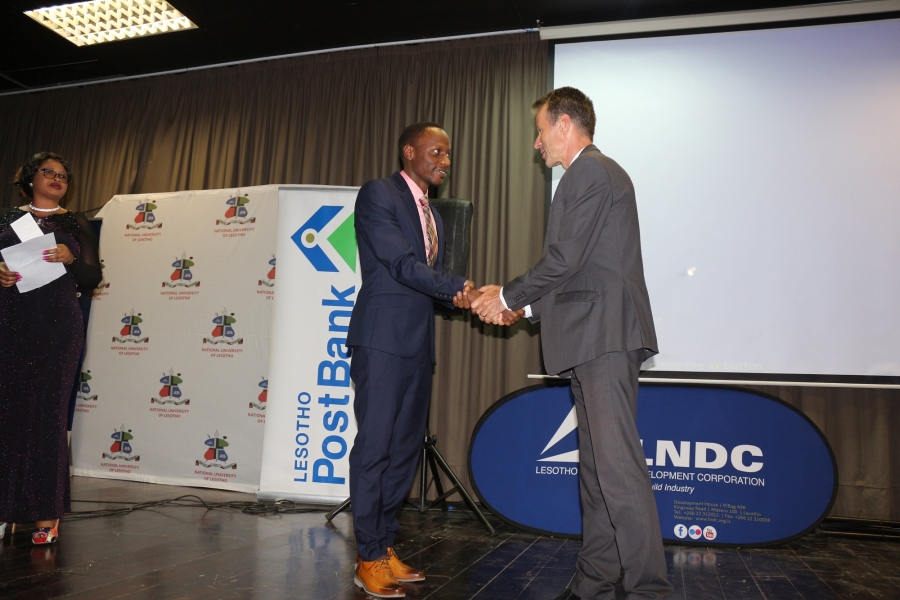
Below, Tonny Kukeera, who is currently completing the final few weeks of a three month academic placement at the National University of Lesotho, shares his final blog on the relevance of information access in off-grid households. The photograph attached shows Tonny collecting his award for winning the poster and pitch competition at the 2nd Africa-EU Renewable Energy Research and Innovations Symposium, held in Lesotho in January 2018 - many congratulations Tonny!
In the recent years, the world has witnessed an astronomical growth in the off-grid industry. Notably, the investment growth has reached 15-fold since 2012 to $276 million in 2015 with Pay-As-You-Go companies taking over 87% as reported in the Renewable Energy Global Status Report 2016. A number of factors can be thought of as contributors to the successful growth of the industry; ranging from the costliness of grid electricity infrastructure to the geographical set ups and community settlement arrangements – many communities in developing countries are still isolated and the population density does not make it economically feasible for grid extensions. It is important to note that the variation of the least cost option for energy access is dependent on load and distance. Most homes in Sub-Saharan Africa utilize low consuming loads, are located in areas with complex terrains that are far from the national grid. These among a myriad of other factors make it difficult for isolated communities to access the grid. In fact, low grid access has been one of the biggest motivation for the off-grid industry growth. Other aspects that have greatly contributed to the industry growth are; 1) the falling prices of solar panels– the price of solar panel in 2016 was recorded to be $0.447/watt which is almost 227 times lower than what it was in 1975, $101.5/watt - which is expected to even drop further in the coming years with more investments in research and development. This is likely to improve the efficiency of solar modules. Additionally, the success of off-grid technologies for providing energy solutions in recent years is largely attributable to the availability of energy efficient appliances. The off-grid industry is expected to even grow further with research stats projecting that 1 in 3 off-grid households globally will use off-grid solar by 2020. This is more than good news as more people will be able to have access to modern energy services and the advantages therein.
On the flip side, the off-grid industry still suffers some setbacks, the main ones being capacity limitation, and ensuring energy efficiency amidst operation and maintenance/user errors, a matter that has often been overlooked in the past. The main focus has always been on how to ensure “energy access” and developing innovative business models which are user friendly. However, with energy access growing, it is high time we started looking at how to promote use efficiency by making off-grid consumers understand what they are consuming and how to maximize it. Undertaking such efforts will assist in addressing the problems facing the off-grid industry in a sustainable manner. Attempting to understand and eventually solve these difficulties calls for a thorough understanding of the different user perspectives, behavioral patterns, engineering and social aspects. In a nutshell, the challenges facing off-grid systems cannot be approached in a one size fits all kind of situation. Some companies involved in off-grid projects have resolved to provide after sales services including maintenance but still, this is costly in the long run and whether it is sustainable or not, is a question whose answer I cannot tell for now.
So, in a bid to provide a solution, it is imperative to ensure a proper flow of information between the users and the energy systems to foster familiarization - Information access is the heart and soul to understanding any phenomena.
This will help create a system-user bond hence establishing a point of understanding. But before that, the question to be answered is “How can electricity consumption information be made transparent, understandable and accessible in off-grid household electricity users?”. If this can be done, the assumption is, users will be able to understand what they are using and how to maximize the performance. As thus; 1) energy efficiency will be promoted, 2) maintenance and user errors will be minimized, and lastly aftersales services will not be needed for long. One would not be entirely wrong to view off grid systems as a silver bullet to energy access problems, however, until the problems affecting the industry are addressed, one could not be entirely correct. This was the winning poster presentation and pitch at the 2nd Africa-EU Renewable Energy Research and Innovations Symposium 2018 that was held in Maseru – Lesotho hosted by the National University of Lesotho (see photo of Tonny receiving the poster competition award above). This is my current research and opportunities for collaboration are welcome.
